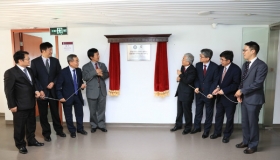Report and Suggestions on How Companies in Shenzhen Fight Coronavirus Pandemic
Report and Suggestions on How Companies in Shenzhen Fight Coronavirus Pandemic
Authors: Zhang Bohui, Wu Haifeng, Zeng Zixuan
Although the situation of the coronavirus in China is improving, and the production and people’s life is getting back to normal, many challenges lie ahead for China’s economy. The Center for Fintech and Social Finance of Shenzhen Finance Institute formed a research group before the Chinese New Year and conducted an online survey via questionnaires, covering nine communities and 974 small and medium-sized enterprises in Shenzhen.
The questionnaire includes 14 questions related to seven aspects, such as companies’ basic information, major difficulties, turnover declines, responses and implementations of preferred policies, and countermeasures. Through the research, the report pointed out four issues facing the small- and- medium companies. Based on assumptions of duration and impacts of the pandemic, five suggestions for policy have been proposed, for example, launching and implementing temporary policies, cutting taxes, exploring bonds for the small and medium-sized medium enterprises in the pilot demonstration area of socialism with Chinese characteristics, extending holidays and resuming consumptions suspended during the outbreak of the pandemic. Those suggestions aim to recover and promote China’s economy stably after the pandemic.
Abstract
In nearly one month, we adopted telephone conferences, online questionnaires, and other ways to research on local companies. Currently, work resumption and lowering operation costs have become the urgent needs of local companies. As many small and medium-sized companies fail to fully restore production capacity, falling into the scarcity of cash flow and the burden of high operation costs, many of them are facing the risk of close-down. In the research, more than 90% of companies mention their turnovers of the first half of 2020 would drop year on year. It is expected that the sales revenue of 31% of these surveyed companies will decline by over 50% compared with that of the previous year. Since this February, the Shenzhen government has released a series of preferred policies to distribute health packages, ensure the production of medical supplies, subsidize loans, issue financing policies, reduce taxes and rents, support labor markets and provide emergency financial assistance. As far as the negative impacts brought by the pandemic, 56.28% of companies in the survey hope the government provides subsidiaries or reductions and exemptions of social insurance, rent, salary, and other costs. More than 80% of companies hope to receive financial supports from financial organizations to overcome difficulties. On the other hand, countermeasures are also taken to relieve financial pressure. Most of the companies have reached a consensus to promote digitalization-oriented transformations and made efforts to extend online businesses to make up the losses caused by the contraction of offline businesses.
Generally speaking, accelerate the implementation of feasible and effective policies. Focusing on the principal contradiction, the government needs to release combined policy accordingly. While taking effective pandemic control measures, the government needs to encourage the resumption of production, deal with the reasonable appeals of small and medium-sized enterprises, and prevent the severe shock on Shenzhen’s macroeconomy development caused by the pandemic. In terms of the pandemic situation, the government needs to make a better arrangement to release policies, and improve the efficiency and implementation of policies and funds.
Elaborate on how current policies can be implemented, strengthen communications with private companies and, implement policies effectively. The items of policies need to be specified, and the coordination of official departments and industrial associations needs to be strengthened to provide systematic and feasible guidance for companies and ensure the effective implementation of policies.
Reduce the debts of companies and optimize financial tools. Commercial finance organizations are encouraged to provide customized and diversified services for companies. Financial organizations need to be coordinated to exert financial advantages of supply chain and provide necessary supports for small and medium-sized companies with strong solvency and industries that can resume production immediately. It is necessary to estimate the lasting influence of the pandemic, upgrade financial assistance plans, provide financial services for companies and issue an endorsement for credits. Moreover, the government needs to provide funds to explore how to use bonds to vitalize small and medium companies in the pilot demonstration area of socialism with Chinese characteristics (special assistance bonds for private companies) and release liquidity for the small and medium enterprises that meet standards.
Continuously ensure the production and supply of basic medical supplies to support the economic recovery. At present, the Shenzhen government has normalized the production of medical supplies via many channels. With long lasting uncertainty and risk of imported COVID-19 cases, the policymakers need to make better preparations for the stockpile of emergency medical supplies in the whole year or even longer. After meeting the demands of medical supplies in Shenzhen, the government needs to give supports for the rest of the country and other cities aboard, maintaining the role model of the pilot demonstration area of socialism with Chinese characteristics.
Release supportive policies for some industries. Foreign trade exports take large shares of Shenzhen’s GDP, and the share of private companies is appropriately 60%. Therefore, the implementation of supportive measures for Shenzhen export companies is helpful in actively responding to the changes in external markets, stabilizing the foreign trades’ scale and improving trade qualities. In the consumption sector, after making a breakthrough in fighting the coronavirus, the government can extend the opening hours of some industries or encourage a 2.5-day weekend to offset the losses caused by the outbreak of the pandemic, ensure economic recovery and boost economic growth. In the manufacturing sector, decision-makers need to consider how to give more supports to work resumption and supply of production materials. Particularly, the government needs to provide convenience for manufacturing companies that still receive many orders in the market. The protection of Shenzhen’s strategic industries need to be taken into consideration as well as the development of small and medium-sized enterprises, so as to avoid profoundly social issues led by high unemployment.




